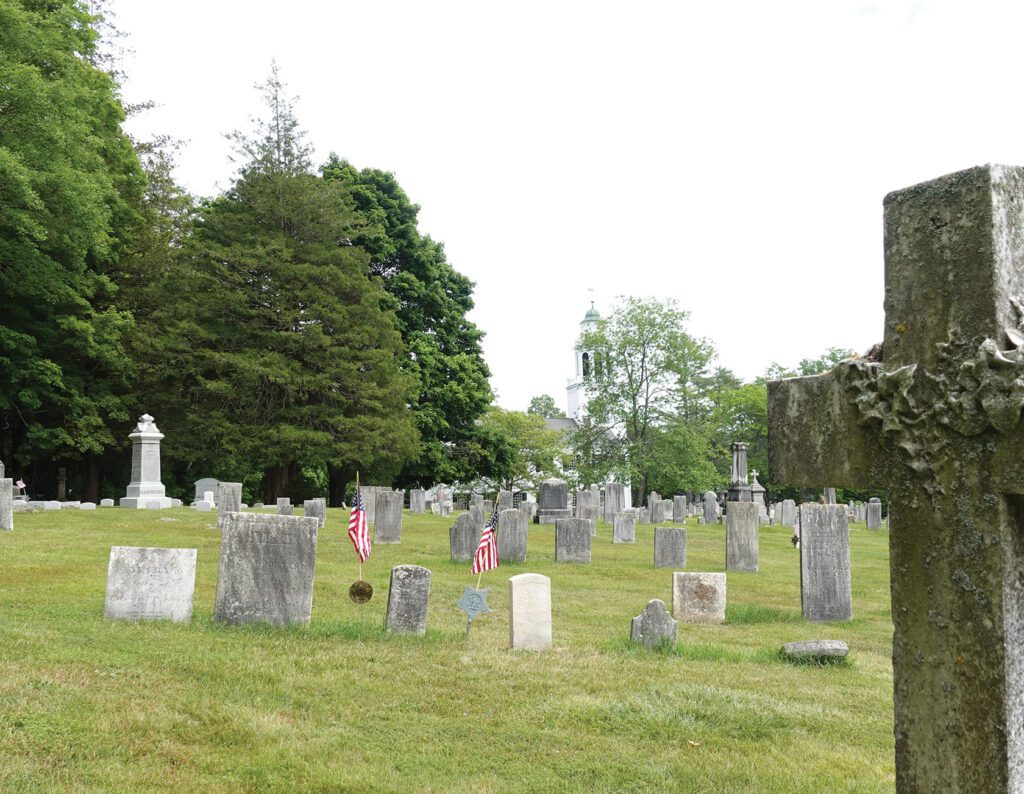Historian finds her ancestor, Civil War soldier, in Lenox, Mass. cemetery
Great-great grandfather served in Mass. 54th regiment

Boston resident Barbara Lewis found the grave in a western Massachusetts cemetery of her paternal great-great-grandfather, Jeremiah Bradley, who fought in the 54th Massachusetts Infantry Regiment during the Civil War, the unit featured in the 1989 movie “Glory” and in a bas relief monument on Boston Common.
Lewis, a poet, historian and author who is now retired, said she grew up surrounded by her mother’s family from South Carolina and it wasn’t until she moved to Boston to work at UMass Boston that she started researching her father’s side of the family, which was from the North.
“Joseph Bradley was my great-grandfather’s name,” she said. “So I looked him up and I looked up his parents’ names, and lo and behold, I found on the web my great-great-grandfather’s enlistment papers in the 54th were online. So I got in touch with my cousins, and they said they kinda heard about it, but they didn’t really know.”
Lewis consulted military pension records, enlistment papers, the town planner and historians from the public library in Lenox, Massachusetts. She was able to secure a grant to further research the 54th’s soldiers from Lenox and found six others, like her ancestor, buried in the Church on the Hill Cemetery in Lenox.
“I couldn’t just get a grant to (research) my family,” she said. “It needed to be all of the Black soldiers who had participated in the Civil War. I wanted to have that research as well. It turned out that there was a long history of the Berkshires, and there’s a very strong commitment to freedom going back to the 1700s.”
While the regiment was raised in Boston, many of the soldiers of the 54th were buried in Beaufort National Cemetery in South Carolina.
David Levinson, the co-author of “On the Other Side of Glory: The Berkshire Men of the 54th Massachusetts Infantry Regiment,” said many families at the time could not afford to ship the bodies of their deceased family members back home.
“The bodies of most Black soldiers were not shipped,” he said. “A lot of the 54th men who died in combat or from disease while they were in the South were buried there because the families couldn’t afford to send them north. So they were buried in national cemeteries in the South.”
The soldiers who returned from the war were buried in different cemeteries in Boston and other Massachusetts cities like Mount Hope Cemetery in Mattapan, Pine Grove Cemetery in Lynn, Mount Auburn Cemetery in Cambridge and Oak Grove Cemetery in New Bedford, among others, according to the 54th Massachusetts Volunteer Regiment, a nonprofit based in Washington, D.C., dedicated to preserving the memory of the regiment and all Black soldiers in the Civil War.
The 54th Massachusetts Infantry Regiment was created two years into the Civil War after Frederick Douglass, a prominent abolitionist, advocated the enlistment of Black soldiers to help the Union Army win. President Abraham Lincoln then issued the Emancipation Proclamation on January 1, 1863, and authorized the creation of Black regiments.
“White folks in the North were losing the war,” Lewis said. “Lincoln was aware of the need for the North to win the war, and how it was not likely for that to happen without the sacrifice or the inclusion of Black bodies.”
Douglass worked with the then Massachusetts governor, John Andrew, and Lincoln to call for Black soldiers. More than 1,000 men responded. The soldiers trained in Camp Meigs, located in Hyde Park, prior to going into the war.
Former state representative Byron Rushing said members of the 54th came from various northern states.
“The governor of Massachusetts at the time was a big-time abolitionist and so he actually wrote Lincoln and asked that the first (authorized) regiment be called up in Massachusetts,” he said. “It was this big campaign to get Black people to join once they had the permission, and they came from all over the North.”
The first Black regiment from the North in the Civil War was organized the summer before — without official authorization — at Fort Scott, Kansas. In October 1862, the 1st Kansas Colored Infantry fought its first battle in neighboring Missouri.
After finding her ancestor’s grave, Lewis and some of her cousins hired someone to clean the tombstone after all the years of weathering. Lewis said she couldn’t believe the information she found and that it led her to ask even more questions about the origins of her ancestors.
“I was like, ‘Wow! That’s where he is!’ and ‘How did he get to Lenox?’ I wanted to know more and more and more about him and his family, and I’m still on that quest and doing this research,” she said.
Levinson added that the men of the 54th who returned from war faced discrimination when it came to veterans’ benefits and their names were even left off some Civil War monuments.
“They were heroic figures. They were not drafted, they volunteered. That’s the main reason they deserve to be honored like any other veteran,” he said. “They were forgotten after the war. They were discriminated terribly against when it came to veterans’ benefits. They were denied benefits that white veterans got, there were long delays in getting their benefits or they got less benefits than they were entitled to.”
Lewis cited her experience as an example of why Black people should research their family’s history.
“This is something that we should pass down to our family members,” Lewis said. “The younger generation should know this, and the effort of cleaning the grave was saying ‘Here’s something we can be proud of,’ for my generation, your generation and generations to come. We contributed to this country being independent and unified.”






